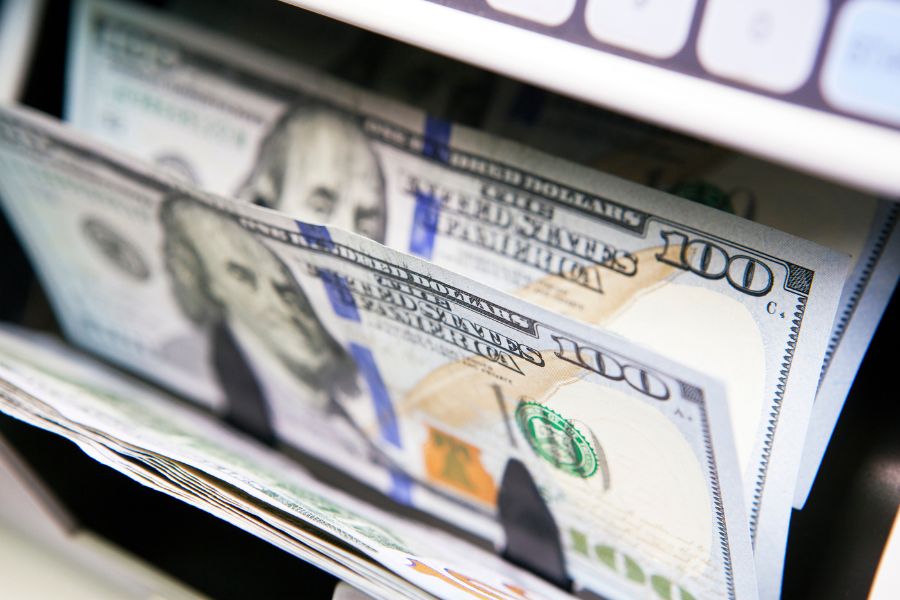Challenging the Almighty Dollar!
The US dollar has enjoyed an exorbitant privilege for over a century, but its unwavering reign is now being seen as under threat. Analysis shows, on the other hand, that a clear contender is not emerging, and the dollar’s safe haven status continues to make it the overwhelming favourite in forex markets; particularly in volatile phases like the present one.
- The roots of the withering privilege enjoyed by the US dollar are based on a shaky foundation.
- The declining forex reserves of the US dollar are not enough to glide a shift and interrupt the large reserves of the US adversaries.
- The US dollar as a global currency is falling towards doing more harm than good to other leading economies in the world.
- China and Russia have set their foot on waning the US dollar’s influence in the currency exchange market.

US dollars rose to power as the global reserve currency after replacing the British Pound, following the World War. This is when many countries turned to the US for loans to curb their financial crunch, hence paving the way for the country’s currency to claim a dominant position. Since then, the US dollar has been dominating global currency markets as the preponderant reserve currency.
Before moving further into our discussion, let us first understand what we mean by reserve currency.
A reserve currency is a dominant or hard currency that is used in international trade as a medium of common exchange between countries. For example, if country A needs to trade with country B, let’s say for crude oil, then they shall resort to the US dollar, making it the reserve currency.
Such a global currency is considered to be supreme in a global trading mechanism. Countries dealing in the international market are naturally compelled to hold such reserves, to carry out trading.
Now, the US dollar is still in a dominant position as a choice for almost all the countries to trade. This highlights how this global currency has enjoyed an unfathomable amount of superiority over other currencies by resorting to unquenchable currency printing. Data indicates that the dollar’s share, as an invoicing currency, is 3.1 times its share in world exports, which shows that many non-US exporters invoice their exports in dollars. However, this has unveiled a global crisis in order. While this is undoubtedly advantageous to the US, trade deficits have massive disruptive implications on other economies. This has invited discussions on whether sustaining this overreliance to the dollar is a healthy trend.
Declining Share of Dollar in Forex Reserve
Many countries have now been trying to prune their holdings of US dollars, firstly due to the recession in order and then of course with the Chinese Yuan intervention creating bilateral trade agreements with its allied countries.
Is There an Alternative to US$ as Reserve Currency?
It is undeniable that the dominance of US dollars is difficult to overcome because of its large network; it shall also be noted that many countries prefer USD as the reserve exchange, due to its deep regulatory framework and transparent transactions in the financial market, as well as for being the bearer of the most clearer corporate governance. This implies that bringing an alternative of this exchange currency to the global forum shall also require an agreement and a cordial settlement with the US.
This, however, brings to light the mentioned sanctions by Russia and China to start chipping away at the US currency dominance. It appears that things are falling into place for the Chinese Yuan, as can be seen through its increasing use in bilateral trade.
If we look at the data of recent reports by many world research organizations, many allied countries of China and Russia have reportedly agreed to carry out their trade in Yuan. This is being seen as a vital step towards a more diverse basket of global currencies.
The attractive factor here for other developing economies, specifically Asian countries, is that if they intend to run large trade deficits currently, it may compel them to either increase their export or increase their reserves. If Yuan is made the global trade currency, the Chinese intend to simplify trade agreements to curtail such issues of global trade between its allied countries. This shall easily win the confidence of its supporting countries and assert its good status, thereby shifting the balance vis-à-vis the US.
The US recession and the negligence to indemnify repercussions have led to heated arguments among global analysts. Experts in the global forum have suggested that countries with reserve surplus can invest in developing countries to mitigate the issue. However, just inviting capital flows from the surplus countries will not impact the global dependence on the US dollar as a foreign reserve.
Impact of Taking Down the US$ as Global Currency
While currently, the USD as a global currency does not appear to be a favorable option by many of its opposing countries, there may be implications of disturbing the economic balance by abandoning the US dollar as a reserve currency. Let us see how.
- Diverting global savings may lead to a collapse in exports, thus inviting a dry spell in manufacturing units and hence the unemployment surge.
- Taking off the US as the runner of current account and trade deficit shall lead to a massive deficit and force the world to reduce its collective trade significantly.
- The fall in world savings shall lead to income redistribution in many countries and political turmoil, and regaining the steadiness shall take an ample amount of time for such countries.
- Even with diversification in the picture, a majority of the countries are strangled by the large US dollar reserves. This cannot be turned away so easily and with an immediate effect.
- The fiscal deficit may intensify if the net foreign capital is not balanced by an extensive domestic investment, creating a huge disparity in the domestic household debt. This may take many years to bring the struggling economies in shape.
An increase in bilateral trade agreements may appear to be taking a toll on the US dollar as the foreign reserve currency, but replacing it shall take many years. In the meantime, the US shall not sit back and let its holding keep falling off the trade. It will endeavour to maintain its dominance either unilaterally or by forming its alliance collectively. But, it will not take an easy fall. In the midst of this, it will be an interesting scenario to see if its adversaries like China and Russia succeed in their mission to create alternatives.

Source: EY
What will the future hold in such a scenario? The reduction of dollar reserves, as an IMF working paper by Serkan Arslanalp, Barry Eichengreen, and Chima Simpson-Bell, has not led to an increase in reserves of other traditional currencies, like the pound, euro and yen. A quarter of the shift has been towards the renminbi, while the rest is in other non-traditional currencies of smaller countries like Australian dollar, Canadian dollar, Chinese renminbi, Korean won, Singapore dollar and Swedish krona. So a real strong basket of contenders doesn’t seem to be emerging at the moment. And in volatile market situations like the present one, the dollar’s safe haven status continues to make it the overwhelming favourite in forex markets.
References:
https://carnegieendowment.org/chinafinancialmarkets/86878
https://www.managementstudyguide.com/global-currency-reserve-system.htm













Leave a comment